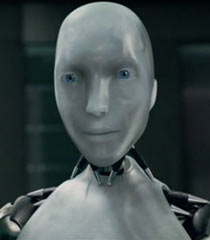SESSION 3
Artificial intelligence might be a threat to humans, but not for the reasons you think
NOTE: hover over words in blue for additional information
Our computers are getting better thanks to the exponential developments that drive this area of science and engineering. The computer you buy today is obsolete in R&D terms and yet is roughly twice as powerful as the one the same money could buy 18 months earlier. This has been happening for decades.
My students have access to computers that are 1 million times more powerful than the ones I began my AI research on. If we had improved air travel as fast I would fly from London to Sydney in less than a tenth of a second.

Terminator 2. Image from fredzone.org.
STRUCTURE
- Reading
- Artificial intelligence might be a threat to humans, but not for the reasons you think
- Exercises
- Vocabulary
- True/False
- Extras
- Speech recognition in Scotland
- Google Assistant






